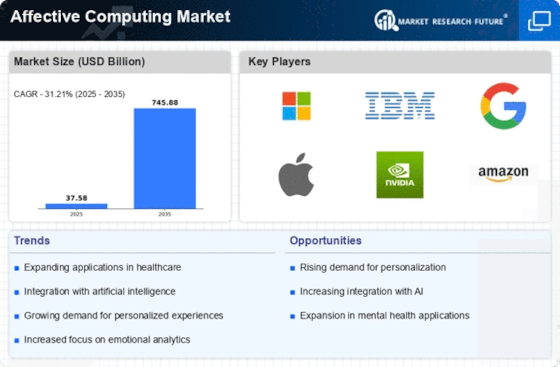Top Industry Leaders in the Affective Computing Market

Competitive Landscape of Affective Computing Market:
The Affective Computing market has witnessed substantial growth in recent years, driven by increasing demand for advanced human-computer interaction technologies. As businesses recognize the importance of emotional intelligence in technology, the market has evolved to encompass a range of solutions designed to interpret and respond to human emotions.
Key Players:
- Google LLC (U.S.)
- Microsoft Corporation (U.S.)
- IBM Corporation (U.S.)
- Saffron Technologies Inc. (U.S.)
- Qualcomm Inc. (U.S.)
- Elliptic Labs A/S (Norway)
- Eyesight Technologies Ltd. (Israel)
- Pyreos Limited (Scotland)
- Softkinetic Systems (Belgium)
- SiteCorp. (The Netherlands)
- Brunswick Corporation
Strategies Adopted:
- Research and Development: Key players are heavily investing in R&D to enhance the accuracy and capabilities of their emotion-sensing technologies. Continuous innovation is a crucial strategy to stay ahead in this competitive landscape.
- Partnerships and Collaborations: Collaborations between technology companies and research institutions are common, aiming to pool resources and expertise. Such partnerships accelerate the development and adoption of Affective Computing solutions.
- Customized Solutions: To cater to diverse industry needs, companies are increasingly focusing on providing customized Affective Computing solutions. Tailoring technology to specific sectors ensures higher adoption rates and customer satisfaction.
Factors for Market Share Analysis:
- Technology Integration: Companies that seamlessly integrate Affective Computing technologies into existing products and services gain a competitive edge. User-friendly and well-integrated solutions contribute significantly to market share.
- Accuracy and Reliability: The efficacy of emotion-sensing technologies is a critical factor. Companies that consistently deliver accurate and reliable results in emotion recognition gain trust and, consequently, market share.
- Global Reach: The ability to expand operations globally and penetrate diverse markets contributes to a company's market share. Establishing a strong international presence is key for sustained growth in the Affective Computing market.
New and Emerging Companies:
- Emotient: This startup specializes in facial expression analysis and emotion recognition, offering real-time insights. Emotient's innovative approach has attracted attention in the Affective Computing space.
- Beyond Verbal: Focused on voice analysis for emotional intelligence, Beyond Verbal is gaining traction. The company's unique offering appeals to sectors such as call centers and voice-based applications.
Current Company Investment Trends:
- Acquisitions: Many established players are acquiring smaller Affective Computing startups to broaden their portfolio. These acquisitions enable companies to incorporate niche technologies and expand their market presence.
- Venture Capital Investments: A growing number of venture capital firms are investing in Affective Computing startups, recognizing the potential for significant returns. This trend indicates a positive outlook for emerging companies in the market.
- Diversification: Key players are diversifying their portfolios by investing in a range of Affective Computing applications. This strategy ensures resilience and adaptability in a dynamic market.
Latest Company Updates:
December 2023: Affectiva, a leading player in affective computing, announces a partnership with Beyond Verbal to develop new solutions for measuring and analyzing emotions in customer interactions.
November 2023: Cognito, another key player, launches a new platform called Cognito Cloud, which offers developers tools for building affective computing applications.
October 2023: Google AI announces the development of a new AI model called "LaMDA 3" that can better understand and respond to human emotions in conversation.
September 20, 2023: Affectiva, another leader in affective computing, unveils a new platform called "Affectiva Aware." This platform combines facial expression analysis with other AI technologies to provide real-time insights into customer emotions and engagement.










